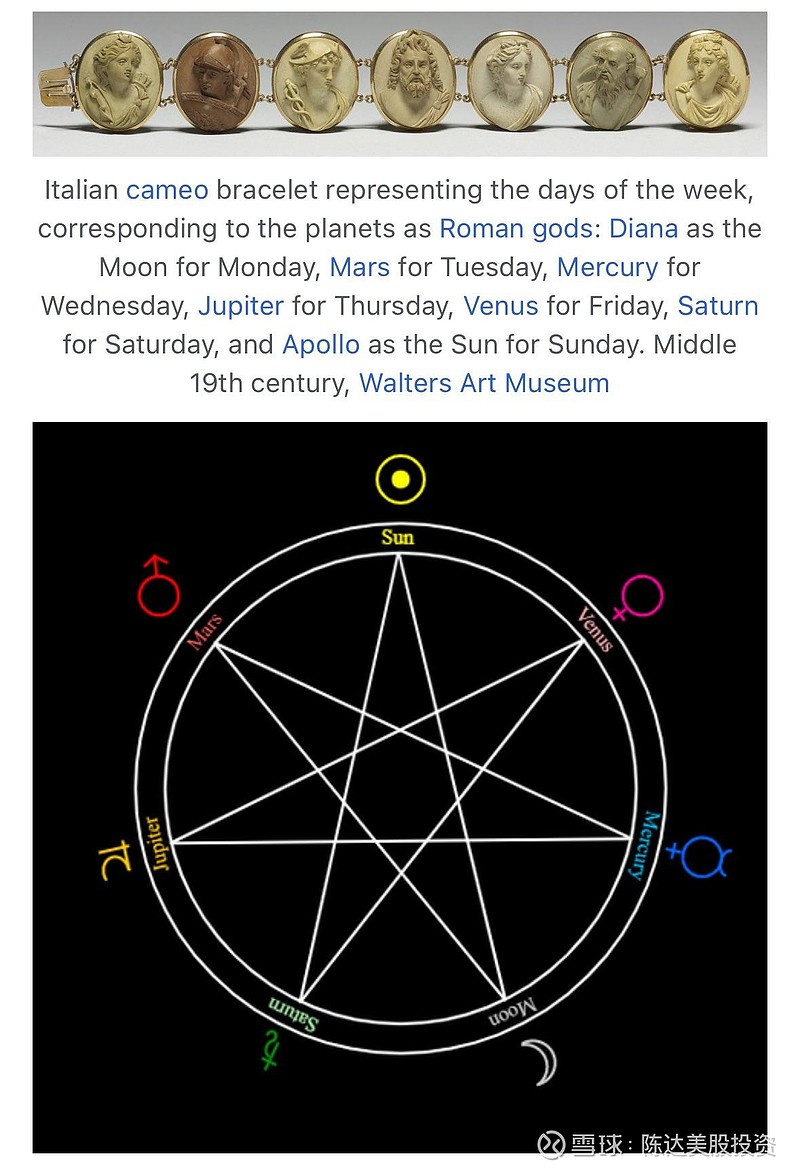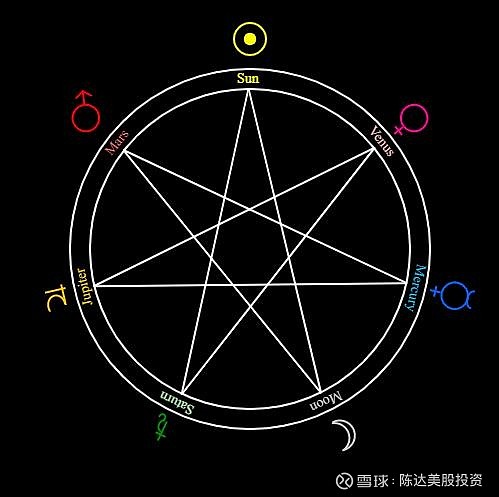Sunday周日自不必说,日曜日;
Monday周一,mon=moon,周一是月曜日;
Tuesday周二,古英语 "Tiw's day",这个是古北欧语的痕迹,是战神,而战神在罗马语境里是Mars,火星英文叫啥?——Mars,周二是火曜日;
Wednesday周三,古英语Wōdnesdæg,这个十分不明显,不过周三的拉丁语对应词是mercury,水银、水星那个词,周三是水曜日;
Thursday周四,英语里Thur来自于北欧神话的主神Thor (这就是漫威的雷神嘛你懂的),拉丁语罗马语境下对应的诸神就是朱庇特啦,Jupiter 木星,周四是木曜日;
Friday周五,古北欧语称金星为Friggjarstjarna,金星就是venus,周五是金曜日;
Saturday 周六也很简单, 土星是Saturn,周六是土曜日。
日语的七曜日其实不是原创、也完全是我们唐朝的古文化漂洋过海,过去的。当然我们其实是中转站,也是从天竺进口而来(当然最早也是古巴比伦),比如北天竺佛教沙门不空译有《宿曜历经·七曜直日历品第八》:
故今列诸国人呼七曜如后,
日曜太阳,胡名蜜(康居语:Mir),波斯名曜森勿,天竺名阿儞(泥以反)底耶(二合)。
月曜太阴,胡名莫(康居语:Maq),波斯名娄祸森勿,天竺名苏上摩。
火曜荧惑,胡名云汉(康居语:Wnqan),波斯名势森勿,天竺名粪盎声哦啰迦盎。
水曜辰星,胡名咥(丁逸反,康居语:Tir),波斯名掣森勿,天竺名部(引)陀。
木曜岁星,胡名鹘勿(康居语:Wrmzt),波斯名本森勿,天竺名勿哩诃娑跛底(丁以反)。
金曜太白,胡名那歇(康居语:Naqit),波斯名数森勿,天竺名戌羯罗。
土曜镇星,胡名枳院(康居语:Kewan),波斯名翕森勿,天竺名赊乃以室折啰。
右件七曜,上运行于天,下直于人间。其精灵神验、内外典籍,具备自南西北三方诸国。
Sunday: Old English Sunnandæg (pronounced [ˈsunnɑndæj]), meaning "sun's day". This is a translation of the Latin phrase diēs Sōlis. English, like most of the Germanic languages, preserves the day's association with the sun. Many other European languages, including all of the Romance languages, have changed its name to the equivalent of "the Lord's day" (based on Ecclesiastical Latin dies Dominica). In both West Germanic and North Germanic mythology, the Sun is personified as Sunna/Sól.
Monday: Old English Mōnandæg (pronounced [ˈmoːnɑndæj]), meaning "Moon's day". This is equivalent to the Latin name diēs Lūnae. In North Germanic mythology, the Moon is personified as Máni.
Tuesday: Old English Tīwesdæg (pronounced [ˈtiːwezdæj]), meaning "Tiw's day". Tiw (Norse Týr) was a one-handed god associated with single combat and pledges in Norse mythology and also attested prominently in wider Germanic paganism. The name of the day is also related to the Latin name diēs Mārtis, "Day of Mars" (the Roman god of war).
Wednesday: Old English Wōdnesdæg (pronounced [ˈwoːdnezdæj]) meaning the day of the Germanic god Woden (known as Óðinn among the North Germanic peoples), and a prominent god of the Anglo-Saxons (and other Germanic peoples) in England until about the seventh century. This corresponds to the Latin counterpart diēs Mercuriī, "Day of Mercury", as both are deities of magic and knowledge. The German Mittwoch, the Low German Middeweek, the miðviku- in Icelandic miðvikudagur and the Finnish keskiviikko all mean "mid-week".
Thursday: Old English Þūnresdæg (pronounced [ˈθuːnrezdæj]), meaning 'Þunor's day'. Þunor means thunder or its personification, the Norse god known in Modern English as Thor. Similarly Dutch donderdag, German Donnerstag ('thunder's day'), Finnish torstai, and Scandinavian torsdag ('Thor's day'). "Thor's day" corresponds to Latin diēs Iovis, "day of Jupiter" (the Roman god of thunder).
Friday: Old English Frīgedæg (pronounced [ˈfriːjedæj]), meaning the day of the Anglo-Saxon goddess Frīg. The Norse name for the planet Venus was Friggjarstjarna, 'Frigg's star'. It is based on the Latin diēs Veneris, "Day of Venus".
Saturday: named after the Roman god Saturn associated with the Titan Cronus, father of Zeus and many Olympians. Its original Anglo-Saxon rendering was Sæturnesdæg (pronounced [ˈsæturnezdæj]). In Latin, it was diēs Sāturnī, "Day of Saturn". The Nordic laugardagur, leygardagur, laurdag, etc. deviate significantly as they have no reference to either the Norse or the Roman pantheon; they derive from Old Nordic laugardagr, literally "washing-day". The German Sonnabend (mainly used in northern and eastern Germany) and the Low German Sünnavend mean "Sunday Eve"; the German word Samstag derives from the name for Shabbat.
照下图画个七芒星,就是一周的顺序。

